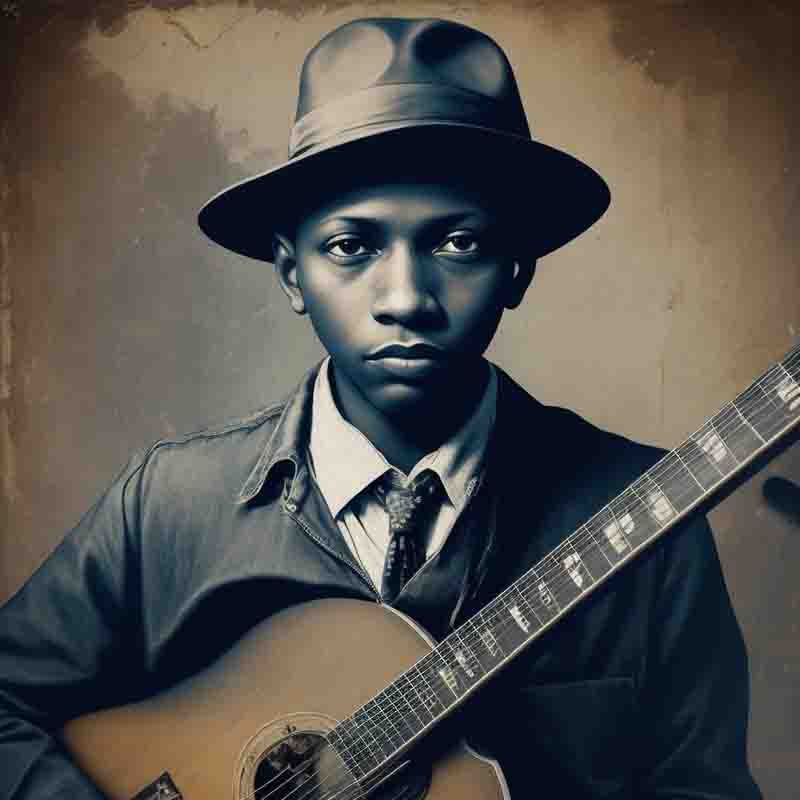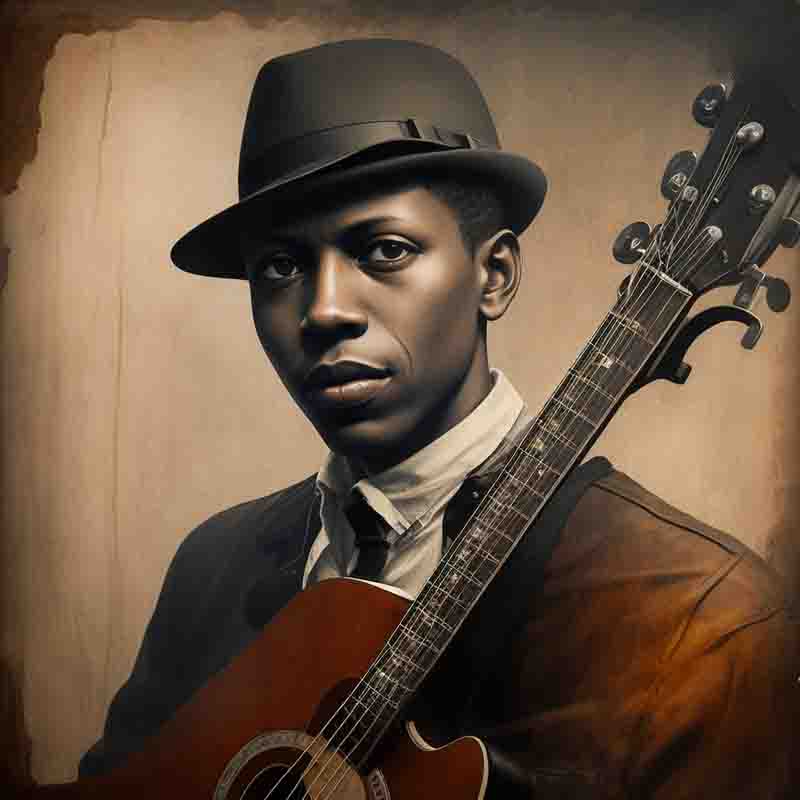Blues: Universal Musical Language of the Soul
Rooted in deep emotions and historical narratives, the blues serves as a powerful form of artistic expression that captures the essence of life's joys and struggles. Beyond its musical significance, the blues has crossed cultural boundaries, influenced numerous genres and contributed to the vibrant overall picture of global musical heritage.

The blues is a musical genre that emerged from the depths of African-American life, occupies a unique place in the history of American music.
Blues is not just a genre; it's a journey through the human experience, expressing the joys and sorrows of life.
The earliest forms of blues were deeply rooted in African musical traditions, work songs, and spirituals, creating a musical language that resonated with the struggles and triumphs of the community.
The genre, which hails from the Mississippi Delta and has since crossed each continent, and paved an indelible footprint on the global music arena.
Over time, the Blues has evolved into various styles, influencing genres like guitar rock, jazz, and soul, while maintaining its unique cultural and emotional resonance.
As a precursor to the great American cultural asset of jazz, the blues underwent considerable musical and progress.
The influence of the blues on rock'n roll is arguably best described by Muddy Waters' song title "The Blues had a Baby and they named it Rock'n Roll."
The Blues is an expressive musical genre that emerged from the experiences of African Americans and is often characterized by its powerful lyrics, soulful melodies and unmistakable 12-bar chord progressions.
Blues Timeline
Blues music, with its deep emotional resonance and stirring melodies, has a rich history rooted in vibrant African-American culture.
The blues, born from the crucible of hardship and human experience, has evolved over the years, leaving an indelible mark on the musical landscape.
| Time Period | Key Events |
|---|---|
| Late 19th Century | Origin of Blues: Emerged in the African American communities of the Southern United States, drawing from African musical traditions, work songs, and spirituals. |
| 1920s | First Blues Recordings: Pioneering blues artists like Mamie Smith and Bessie Smith recorded some of the earliest blues tracks, introducing the genre to a wider audience. |
| 1930s | Great Depression Era: Blues gains popularity during the Great Depression as it resonates with the economic and social hardships of the time. Country blues and urban blues styles develop. |
| 1940s | Electric Blues: The use of electric amplification transforms the sound of blues, leading to the rise of electric blues artists like Muddy Waters and Howlin' Wolf. |
| 1950s | Chicago Blues Scene: Chicago becomes a hub for blues music, with artists like Muddy Waters, Little Walter, and Willie Dixon shaping the urban blues sound. |
| 1960s | Blues Revival: The British Invasion and folk revival bring renewed interest in blues, with artists like Eric Clapton, The Rolling Stones, and Led Zeppelin incorporating blues influences into their music. |
| 1970s | Blues Rock Dominance: Blues rock becomes a dominant genre, with artists like Stevie Ray Vaughan and The Allman Brothers Band achieving widespread success. |
| 1980s | Contemporary Blues: The blues genre diversifies with the emergence of contemporary blues artists, including Robert Cray and Keb' Mo'. |
| 1990s | Resurgence of Interest: Blues experiences a resurgence in popularity, with artists like Jonny Lang and Susan Tedeschi bringing a new generation of fans to the genre. |
| 21st Century | Global Influence: Blues continues to influence various genres, and festivals around the world celebrate the rich history and diversity of blues music. Contemporary artists blend traditional blues with modern styles. |
The Blues timeline provides a snapshot in the evolution of blues music, tracing its roots and highlighting significant historical milestones, and showcasing its evolution over the years.

From the Delta fields to the bustling streets of Chicago, the Blues has evolved, diversified, and left an indelible mark on the global cultural landscape. Its influence extends beyond musical boundaries, shaping the way we perceive and experience storytelling in various forms.
The Origin of Blues: A Delta Journey
The term "Delta Blues" refers to the distinctive style that emerged in the fertile soil of the Mississippi Delta.
This region, marked by vast cotton fields and a history steeped in slavery, became the cradle of the Blues.
Rooted in the African American experience, the Blues found its voice in the work songs, field hollers, and spirituals of the Delta.
It was a poignant expression of the struggles and aspirations of a community seeking solace through music.
The emergence of Blues was not just a musical evolution; it was a cultural phenomenon that laid the foundation for a genre that would resonate globally.
Pioneers of Delta Blues
Robert Johnson, often mythologized as the enigmatic figure who sold his soul to the devil at the crossroads, stands as a symbol of Delta Blues.
His haunting vocals and masterful guitar work set the standard for the genre. Alongside Johnson, Charley Patton is hailed as the "Father of Delta Blues."
His raw, emotionally charged performances captured the essence of life in the Delta.
These pioneers, despite their brief recording careers, left an indelible mark, influencing generations of Blues musicians.
The early recordings, often made in makeshift studios, played a crucial role in preserving the authentic sound of Delta Blues.
The Great Migration and Urban Blues
The Great Migration, a mass movement of African Americans from the rural South to urban centers in the North, played a pivotal role in spreading the Blues beyond the Delta.
As people sought economic opportunities in cities like Chicago and Detroit, they brought the Blues with them.
This migration marked a shift in the sound and themes of Blues, adapting to the realities of urban life.
The Blues, once rooted in the agricultural landscape, now echoed the struggles and aspirations of an urban population.
Chicago Blues and Its Icons
Chicago emerged as a beacon for the Blues during the Great Migration, and it was here that the sound of Blues transformed into the electrified Chicago Blues.
Muddy Waters, a Mississippi native, became a central figure in this evolution.
His electric guitar and powerful vocals defined the Chicago Blues sound. Howlin' Wolf, with his commanding stage presence, further enriched the Chicago Blues landscape.
The Chess Records label, run by Polish immigrants Leonard and Phil Chess, played a crucial role in recording and popularizing Chicago Blues.
The smoky clubs of Chicago became the breeding ground for a new era of Blues.
Blues Styles
The Blues is a genre that defies easy categorization, with various regional styles contributing to its rich tapestry.
Delta Blues, with its raw, acoustic sound, contrasts with the electrified Chicago Blues.
Texas Blues brings its own swagger, while Piedmont Blues, originating in the Southeastern United States, adds a syncopated fingerpicking style.
Each style carries unique characteristics, reflecting the diverse experiences and cultures that shaped them.
Blues as a Foundation for Other Genres
The influence of Blues extends far beyond its own genre, serving as a foundation for the birth of rock 'n' roll.
Artists like Chuck Berry and Little Richard infused Blues elements into their music, creating a sound that would define a generation.
Blues also made its mark in jazz and soul music, with artists like Louis Armstrong and Ray Charles incorporating Blues sensibilities into their work.
Blues-rock fusion further blurred genre boundaries, paving the way for contemporary music.
The Blues Revival
The 1960s marked a significant period for the revival of interest in the Blues.
Influential British musicians, enamored with the authenticity of American Blues, reintroduced it to a new generation.
Eric Clapton and The Rolling Stones, among others, paid homage to Blues legends and introduced their music to a global audience.
This revival not only brought recognition to forgotten Blues pioneers but also sparked a renewed appreciation for traditional Blues.
Contemporary Blues Artists and Subgenres
While the old masters laid the foundation, contemporary Blues artists continue to shape the genre.
Musicians like Joe Bonamassa, One Man Band Likewolf and Susan Tedeschi carry the torch, blending traditional Blues with modern influences.
Subgenres like electric blues, electro blues soul blues, and blues-rock showcase the genre's ability to adapt and evolve.
Thanks to streaming platforms and blues infused artificial intelligence, technology has systematically simplified access to the blues, allowing new voices to emerge and contribute to the evolution of the genre.
Blues Festivals Worldwide
Blues festivals have become vital hubs for celebrating and preserving the genre.
Events like the Chicago Blues Festival and the New Orleans Jazz & Heritage Festival attract enthusiasts from around the world.
These festivals offer a unique blend of established and emerging artists, creating a sense of community among Blues lovers.
They serve as stages where the legacy of the Blues is passed down and where new chapters are written.
Blues Education and Preservation
Organizations dedicated to preserving Blues history, such as the Blues Foundation, play a crucial role in ensuring that the genre's legacy endures.
Blues education programs, whether in schools or online platforms, introduce new generations to the roots and nuances of the Blues.
Digital archives and initiatives contribute to the preservation of historic Blues recordings, ensuring that the voices of the past continue to resonate in the present.
Blues in Film and Television
Blues has not only shaped musical genres but has also made a profound impact on film and television.
From the evocative use of Blues in iconic films like "The Blues Brothers" to its presence in TV series like "The Sopranos," the genre has become a powerful narrative tool.
Blues adds emotional depth, serving as a storytelling device that transcends cultural and generational boundaries.
Blues in Advertising and Branding
Beyond entertainment, Blues has found a place in the advertising and branding, where its emotional resonance is harnessed for effective storytelling.
Brands leverage Blues elements to connect with audiences on a deeper level, tapping into the universal themes of struggle, resilience, and triumph.
Successful campaigns, such as those featuring Blues-inspired music, demonstrate the enduring impact of the genre on modern marketing.
The Blues: African Roots and Spiritual Echoes
The Blues drew heavily from the African musical traditions brought by enslaved people to the region.
The use of call-and-response patterns, intricate polyrhythms, and the incorporation of African instruments laid the groundwork for the distinctive sound of the Blues.
Additionally, the spirituals sung in the fields and the gospel music heard in churches contributed to the emotive vocal styles and themes of redemption and salvation that characterize the genre.
Masters and Pioneers of the Blues
-
Charley Patton (1891–1934): Widely considered the "Father of Delta Blues," Patton's raspy vocals and innovative guitar techniques laid the groundwork for the genre. His recordings, such as "Pony Blues" and "High Water Everywhere," exemplify the raw intensity and emotional depth of Delta Blues.
-
Lead Belly (1888-1949): A folk-blues icon, Lead Belly's songs covered a wide range of topics and were a significant influence on folk and rock musicians.
-
Big Bill Broonzy (1893-1958): A versatile bluesman, Big Bill Broonzy's career spanned from acoustic country blues to urban blues, influencing various styles.
-
Bessie Smith (1894-1937): Bessie Smith, the Empress of the Blues, possessed a voice that soared above the cacophony of her era. Born into poverty in Chattanooga, Tennessee, Smith rose to prominence as one of the most influential blues and jazz vocalists of the 1920s and 1930s.
-
Memphis Minnie (1897-1973): A pioneering female blues guitarist, Memphis Minnie's influential recordings and strong vocals played a vital role in shaping the blues.
-
Son House (1902–1988): A contemporary of Robert Johnson, Son House's powerful voice and slashing slide guitar style made him a Delta Blues icon. Tracks like "Grinnin' in Your Face" and "Death Letter" showcase House's emotional delivery and profound storytelling.
-
Skip James (1902–1969): Known for his distinctive falsetto voice and intricate fingerpicking, Skip James brought a unique elegance to Delta Blues. "Devil Got My Woman" and "Hard Time Killing Floor Blues" exemplify James's contribution to the genre's emotional depth.
-
Howlin' Wolf (1910-1976): A blues giant with a distinctive voice, Howlin' Wolf's raw, powerful performances made a lasting impact on blues and rock.
-
T-Bone Walker (1910-1975): Often credited with pioneering the electric blues guitar, T-Bone Walker's sophisticated and dynamic playing had a profound impact on the genre.
-
Robert Johnson (1911–1938): The mysterious figure at the crossroads, Robert Johnson's influence looms large in the Delta Blues legacy. His intricate guitar playing and haunting lyrics, as heard in songs like "Cross Road Blues" and "Hellhound on My Trail," continue to inspire generations of musicians.
-
Muddy Waters (1913-1983): Muddy Waters, born McKinley Morganfield in Rolling Fork, Mississippi, transformed the blues, bringing the raw Delta sound to the electric streets of Chicago. As the Father of Chicago Blues, Waters' electrifying performances and innovative approach to the genre made him a central figure in the evolution of blues music.
-
Sister Rosetta Tharpe (1915-1973): A gospel-blues trailblazer, Sister Rosetta Tharpe's guitar skills and soulful voice laid the foundation for rock and roll.
-
John Lee Hooker (1917-2001): Known for his boogie-woogie style, John Lee Hooker's influential guitar work and unique vocal delivery left an indelible mark on blues and rock.
-
Elmore James (1918-1963): Renowned for his slide guitar playing, Elmore James played a crucial role in defining the sound of Chicago blues and influenced many subsequent slide guitarists.
-
Albert King (1923-1992): A master of the blues guitar, Albert King's bending and vibrato techniques influenced countless guitarists in the blues and rock genres.
-
Slim Harpo (1924-1970): Known for his distinctive harmonica playing and laid-back Louisiana blues style, Slim Harpo's influence extended beyond traditional blues, reaching into rock and R&B. Hits like "I'm a King Bee" and "Baby, Scratch My Back" showcase his unique blend of blues and swampy grooves.
-
B.B. King (1925-2015): The "King of the Blues," B.B. King's expressive guitar playing and emotive singing style influenced generations of musicians.
-
Koko Taylor (1928-2009): The "Queen of the Blues," Koko Taylor's powerful vocals and commanding stage presence made her a trailblazer for women in the blues.
-
Junior Wells (1934-1998): A harmonica virtuoso and vocalist, Junior Wells collaborated with Buddy Guy and contributed significantly to the Chicago blues scene.
-
Otis Rush (1934-2018): Renowned for his expressive guitar playing and soulful vocals, Otis Rush's impact on the Chicago blues scene is widely acknowledged.
-
Freddie King (1934-1976): A Texas blues guitarist known for his energetic style, Freddie King's influence extends to rock and blues-rock genres.
-
Magic Sam (1937-1969): A Chicago blues guitarist, Magic Sam's innovative approach to the electric guitar and soulful vocals contributed to the evolution of the blues.
The contributions of Robert Johnson, Bessie Smith, and Muddy Waters to classic blues resonate as a testament to the genre's enduring spirit. In the echoes of their music, we find not only the history of a genre but the heartbeat of American musical expression, carried forward by the eternal flame ignited by these iconic blues pioneers.
The Blues: FAQ
Are you curious about music, art, technology, fashion, lifestyle, and beer?
If so, then you need to subscribe to the free Likewolf newsletter.
100% privacy. When you sign up, we'll keep you posted.
Identity of a Song
Musical Phrases Played on the Guitar
